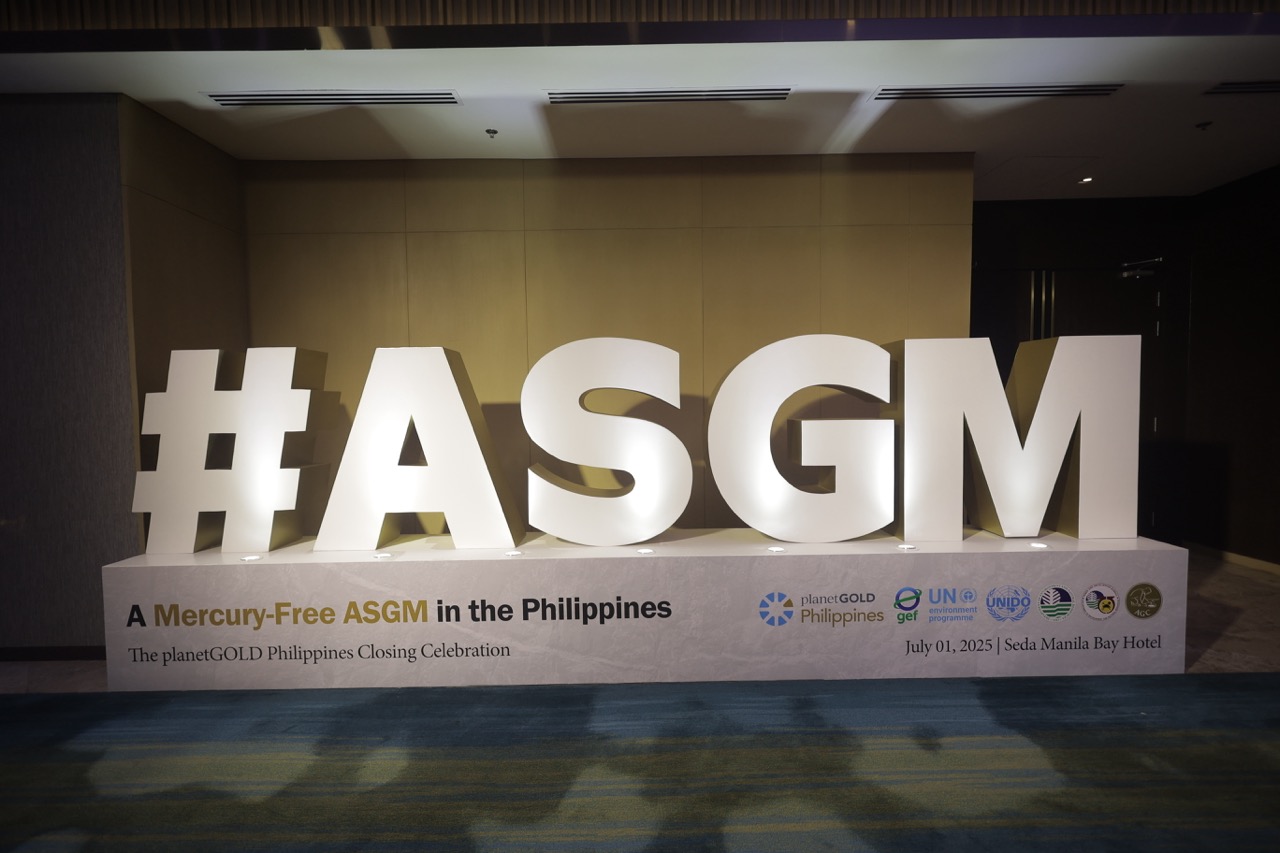
Government officials, community leaders, partner organizations, and small-scale gold miners from across the country marked the successful completion of the planetGOLD Philippines Project with a formal closing ceremony on July 1.
Launched in 2019, the project aimed to reduce–and eventually eliminate–the use of mercury in the artisanal and small-scale gold mining (ASGM) sector in the Philippines. Funded by the Global Environment Facility (GEF), the project was implemented by the United Nations Environment Programme (UNEP), and the United Nations Industrial Development Organization (UNIDO), in partnership with the Department of Environment and Natural Resources – Mines and Geosciences Bureau (DENR-MGB), and executed by the Artisanal Gold Council (AGC).
It also employed a holistic, four-pronged approach: (1) formalization of ASGM operations; (2) improved access to finance and markets; (3) promotion of better technologies and techniques; and (4) communications and knowledge management.
Over its six-year run, the project achieved several groundbreaking milestones. Notably, it built, commissioned, and formally turned over two mercury-free gold processing systems to partner mining associations in Camarines Norte and Mt. Province–providing miners with safer, viable alternatives to traditional mercury-based methods and improving profitability, with gold recovery rates reaching up to 80%.
In addition, the project supported the enhancement of another processing facility to expand its capacity and assist neighboring ASGM operations in increasing their gold recovery.

The project also conducted more than 50 capacity development workshops and trainings for miners, local government units, and stakeholders and developed a one-stop-shop digital knowledge management platform to streamline and digitize the application and permitting process for small-scale miners seeking to formalize their operations.
To ensure progress in the ASGM sector is inclusive, the project promoted gender equity through activities such as integrating gender perspectives into training, engaging women miners in decision-making, and supporting gender-sensitive policies. This resulted in the establishment of Interagency Councils for Women Workers in the Informal Sector in Sagada and Paracale Municipalities, serving as platforms to amplify women’s voices and coordinate gender-responsive programs for all marginalized workers in the informal economy.
Complementing these efforts, planetGOLD Philippines reached over 3 million people through a combination of targeted advocacy and communication campaigns, utilizing in-person interactions, printed materials, broadcast media, and digital platforms.
These initiatives contributed to an estimated reduction or prevention of 1,160 kg of mercury use in the Philippine ASGM sector since the project started, significantly advancing the protection of human health and the environment. To put this into perspective: just 1 gram of mercury can contaminate an eight-hectare lake or release toxic vapors harmful to human lungs when burned [1]. Preventing the release of 1,160,000 grams helps safeguard entire ecosystems and spare hundreds of individuals—particularly miners, their families, and nearby communities – from the dangers of mercury exposure and chronic poisoning.
“Six years have passed, and I’m proud of how this project has served as a bridge between communities, the government, and other key stakeholders,” said Abigail Ocate, National Project Manager of planetGOLD Philippines. “We’ve worked tirelessly to improve the public perception of the ASGM sector, support miners in gaining legal accreditation, and introduce mercury-free alternatives. Most importantly, we’ve empowered communities with knowledge and options for more responsible mining practices. We’ve helped them take pride in their livelihood and see the value of their contribution to the economy.”

Over 4,000 small-scale miners reached the project through comprehensive support, including training, forums, legal assistance, technical guidance, access to financing, and linkages with institutions such as the Bangko Sentral ng Pilipinas as well as other government, academic and private partners. In addition, over 1,000 government officials were engaged–particularly through the establishment of the MGB Core Group of Trainers, who are tasked with sustaining and replicating the project’s achievements and approach across all ASGM communities in the country. It is the first project of its scale in the Philippines to address ASGM challenges in such an integrated and holistic manner.
“This project is a blueprint for scaling up mercury-free and formalized small-scale gold mining nationwide in line with the Minamata Convention,” said DENR Undersecretary Analiza Rebuelta-Teh. “It sets critical priorities – streamlining Minahang Bayan processes, standardizing templates, integrating ASGM data, piloting safer processing technologies, and revisiting BSP’s gold trading policies. These priorities now shape our efforts to strengthen and institutionalize national support for a more inclusive and sustainable ASGM sector.”
As the planetGOLD Philippines Project formally concludes, its legacy is only beginning. The systems established, partnerships forged, and lives empowered over the past years have laid a strong foundation for a more environmentally sound, socially responsible, and just future for the ASGM sector. The work continues – now guided by proven models, empowered communities, and a renewed national commitment to safer, cleaner, more profitable and mercury-free small-scale gold mining.
AGC Philippines will continue to support small-scale gold miners by implementing the National Action Plan for the ASGM sector in the Philippines (NAP ASGM PH) Project. This two-year initiative, funded by GEF and implemented by UNEP, aims to reduce or eliminate mercury use in ASGM, aligning with the Philippines’ commitment to the Minamata Convention. It focuses on providing technical support and capacity-building for NAP implementation and developing the NAP through consultations, policy coordination, and stakeholder engagement. The NAP will serve as a roadmap to formalize the ASGM sector and promote safer, more responsible mining practices. (PR)
